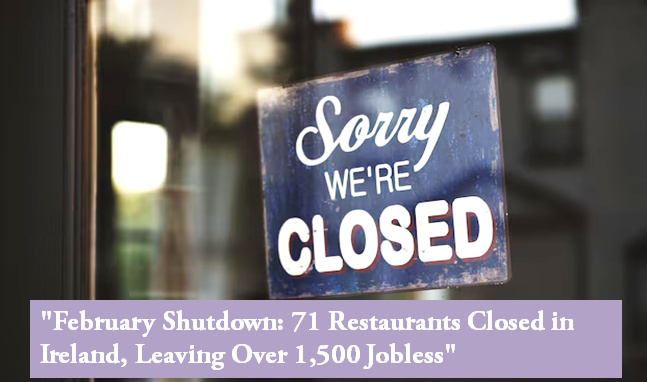Dublin: The restaurant industry in Ireland is facing a profound crisis due to recent shifts in the government’s wage policy, leading to a cascade of closures and job losses. February alone witnessed the closure of 71 restaurants, resulting in over 1,500 individuals losing their employment, as confirmed by the Restaurants Association of Ireland (RAI). Adam Hallissey, RAI’s public affairs executive, highlighted that the trend of closures, amounting to 280 establishments in the latter half of the preceding year, indicates a worsening scenario.
An economic study conducted by economist Jim Power for the Irish Tourism Industry Confederation (ITIC) underscores the gravity of the situation, pointing to escalating business costs within the sector. With approximately 285,000 people employed in hospitality, the study forecasts a staggering increase in wage costs, estimating a rise of €456 million this year alone and projecting a daunting €1.4 billion by 2026. These projections indicate a looming crisis for an industry already grappling with numerous challenges.
The Irish Government’s Economic and Evaluation Service predicts a significant surge in wage costs, anticipating a 6.6% increase this year and a daunting 19.6% rise by 2026, primarily attributed to recent government-initiated wage adjustments. These adjustments include a substantial 12.4% hike in the National Minimum Wage enacted in January, alongside provisions for sick pay, parental leave, extra bank holidays, heightened PRSI contributions, and mandatory pension auto-enrolment, all of which compound the industry’s financial strain.
Moreover, the sector faces additional burdens such as heightened energy expenses, escalating food prices, labour shortages, and an increase in VAT rates, rising from 9% to 13.5%. These collective challenges have placed immense pressure on organisations within the tourism and hospitality domain, with many teetering on the brink of collapse.
While acknowledging the necessity of these measures to ensure fair compensation for employees, CEO Eoghan O’Mara Walsh of the ITIC emphasises the critical need for government support to facilitate their implementation within the industry. He contends that while nobody disputes the imperative of addressing the rising cost of living to ensure adequate wages, it is equally essential for the tourism and hospitality sectors to possess the capacity to absorb these escalating expenses.
A significant portion of businesses within the sector comprises small and medium enterprises (SMEs), operating on narrow profit margins, leaving them particularly vulnerable to economic pressures. Consequently, O’Mara Walsh advocates for tailored assistance measures, including access to enterprise support packages, to safeguard these vital segments of the economy from imminent collapse.
Irish Samachar English News
{OR} Kindly click to follow the Irish Samachar News channel on WhatsApp


Comments are closed.